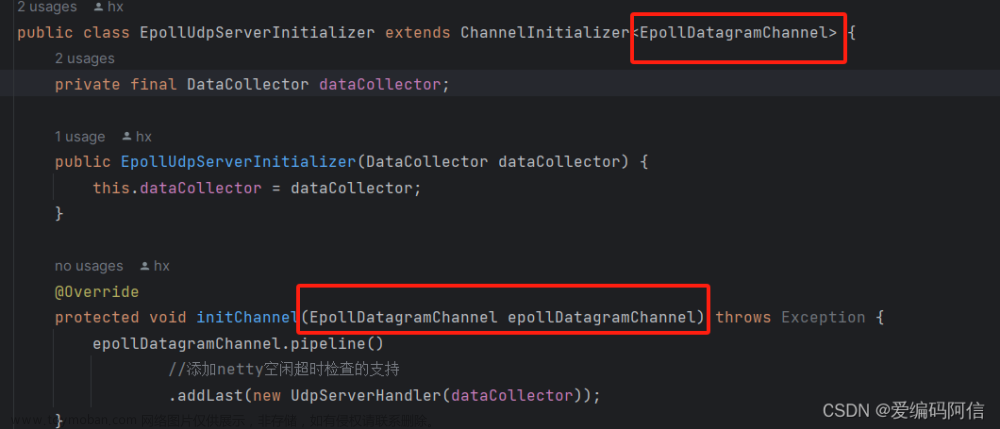针对多网卡情况,绑定其中的一个网卡,接收UDP组播中的数据。文章来源地址https://www.toymoban.com/news/detail-573511.html
package com.demo.udp;
import io.netty.bootstrap.Bootstrap;
import io.netty.channel.*;
import io.netty.channel.nio.NioEventLoopGroup;
import io.netty.channel.socket.InternetProtocolFamily;
import io.netty.channel.socket.nio.NioDatagramChannel;
import java.net.*;
import java.util.Enumeration;
public class UdpReceiver {
// 组播地址
private static final String groupIp = "225.1.2.2";
// 组播端口号
private static final int groupPort = 1234;
// 本机地址
private static final String localIp = "192.168.1.110";
public static void main(String[] args) {
// 组播地址
InetSocketAddress groupAddress = new InetSocketAddress(groupIp, groupPort);
EventLoopGroup group = new NioEventLoopGroup();
try {
NetworkInterface ni = NetworkInterface.getByInetAddress(InetAddress.getByName(localIp));
Enumeration<InetAddress> addresses = ni.getInetAddresses();
InetAddress localAddress = null;
while (addresses.hasMoreElements()) {
InetAddress address = addresses.nextElement();
if (address instanceof Inet4Address) {
localAddress = address;
System.out.println("网络接口名称为:" + ni.getName());
System.out.println("网卡接口地址:" + address.getHostAddress());
}
}
Bootstrap bootstrap = new Bootstrap();
bootstrap.group(group)
.channelFactory(new ChannelFactory<NioDatagramChannel>() {
@Override
public NioDatagramChannel newChannel() {
return new NioDatagramChannel(InternetProtocolFamily.IPv4);
}
})
.localAddress(new InetSocketAddress(localAddress, groupPort))
.option(ChannelOption.IP_MULTICAST_IF, ni)
.option(ChannelOption.IP_MULTICAST_ADDR, InetAddress.getByName(localIp))
.option(ChannelOption.SO_REUSEADDR, true)
.option(ChannelOption.SO_RCVBUF, 2048 * 1024)
.option(ChannelOption.SO_SNDBUF, 1024 * 1024)
.handler(new ChannelInitializer<NioDatagramChannel>() {
@Override
protected void initChannel(NioDatagramChannel ch) throws Exception {
ChannelPipeline pipeline = ch.pipeline();
pipeline.addLast(new NioEventLoopGroup(), new UdpHandler());
}
});
NioDatagramChannel channel = (NioDatagramChannel) bootstrap.bind(groupAddress.getPort()).sync().channel();
channel.joinGroup(groupAddress, ni).sync();
channel.closeFuture().await();
} catch (SocketException e) {
throw new RuntimeException(e);
} catch (UnknownHostException e) {
throw new RuntimeException(e);
} catch (InterruptedException e) {
throw new RuntimeException(e);
} finally {
group.shutdownGracefully();
}
}
}
package com.demo.udp;
import io.netty.buffer.ByteBuf;
import io.netty.channel.ChannelHandler;
import io.netty.channel.ChannelHandlerContext;
import io.netty.channel.SimpleChannelInboundHandler;
import io.netty.channel.socket.DatagramPacket;
public class UdpHandler extends SimpleChannelInboundHandler<DatagramPacket> {
@Override
protected void channelRead0(ChannelHandlerContext ctx, DatagramPacket msg) throws Exception {
final ByteBuf buf = msg.content();
int readableBytes = buf.readableBytes();
byte[] msgData = new byte[readableBytes];
buf.readBytes(msgData);
String s = ByteUtil.bytesToHexString(msgData);
System.out.println("接收到的数据 " + s);
}
}
package com.demo.udp;
import java.io.UnsupportedEncodingException;
import java.nio.ByteBuffer;
import java.util.ArrayList;
import java.util.List;
/**
* Byte数组转换工具类
*/
public class ByteUtil {
/**
* 读取输入流中指定字节的长度
* <p/>
* 输入流
*
* @param length 指定长度
* @return 指定长度的字节数组
*/
public static byte[] readBytesFromTo(byte[] buffer, int from, int length) {
byte[] sub = new byte[length];
int cur = 0;
for (int i = from; i < length + from; i++) {
if (i >= buffer.length) {
throw new ArrayIndexOutOfBoundsException("该报文长度不符合要求!");
}
sub[cur] = buffer[i];
cur++;
}
return sub;
}
/**
* 转换byte数组为int(小端)
*
* @return
* @note 数组长度至少为4,按小端方式转换,即传入的bytes是小端的,按这个规律组织成int
*/
public static int bytes2Int_LE(byte[] bytes) {
if (bytes.length < 4) {
return -1;
}
int iRst = (bytes[0] & 0xFF);
iRst |= (bytes[1] & 0xFF) << 8;
iRst |= (bytes[2] & 0xFF) << 16;
iRst |= (bytes[3] & 0xFF) << 24;
return iRst;
}
/**
* 转换byte数组为Char(小端)
*
* @return
* @note 数组长度至少为2,按小端方式转换
*/
public static char bytes2Char_LE(byte[] bytes) {
if (bytes.length < 2)
return (char) -1;
int iRst = (bytes[0] & 0xFF);
iRst |= (bytes[1] & 0xFF) << 8;
return (char) iRst;
}
/**
* 转换byte数组为short(小端)
*
* @return
* @note 数组长度至少为2,按小端方式转换
*/
public static short littleByteToShort(byte[] data) {
if (data.length != 2) {
throw new UnsupportedOperationException("the byte length is not 2");
}
return ByteBuffer.allocate(data.length).put(data).getShort(0);
}
public static int bytes2Int(byte[] data) {
if (data.length != 4) {
throw new UnsupportedOperationException("the byte length is not 4");
}
return ByteBuffer.allocate(data.length).put(data).getInt(0);
}
/**
* byte数组转换成16进制字符串
*/
public static String bytesToHexString(byte[] bArray) {
StringBuffer sb = new StringBuffer(bArray.length);
String sTemp;
for (int i = 0; i < bArray.length; i++) {
sTemp = Integer.toHexString(0xFF & bArray[i]);
if (sTemp.length() < 2) {
sb.append(0);
}
sb.append(sTemp.toUpperCase());
}
return sb.toString();
}
/**
* 16进制转换为字符串
*
* @param hex
* @return
*/
public static String hexStr2Str(String hex) {
String hexStr = "";
String str = "0123456789ABCDEF";
for (int i = 0; i < hex.length(); i++) {
String s = hex.substring(i, i + 1);
if (s.equals("a") || s.equals("b") || s.equals("c") || s.equals("d") || s.equals("e") || s.equals("f")) {
s = s.toUpperCase().substring(0, 1);
}
hexStr += s;
}
char[] hexs = hexStr.toCharArray();
int length = (hexStr.length() / 2);
byte[] bytes = new byte[length];
int n;
for (int i = 0; i < bytes.length; i++) {
int position = i * 2;// 两个16进制字符 -> 1个byte数值
n = str.indexOf(hexs[position]) * 16;
n += str.indexOf(hexs[position + 1]);
bytes[i] = (byte) (n & 0xff);
}
String name = "";
try {
name = new String(bytes, "GBK");
} catch (UnsupportedEncodingException e) {
// TODO Auto-generated catch block
e.printStackTrace();
}
return name;
}
/**
* 字符串转换为Ascii
*
* @param value
* @return
*/
public static String stringToAscii(String value) {
StringBuffer sbu = new StringBuffer();
char[] chars = value.toCharArray();
for (int i = 0; i < chars.length; i++) {
if (i != chars.length - 1) {
sbu.append((int) chars[i]).append(",");
} else {
sbu.append((int) chars[i]);
}
}
return sbu.toString();
}
/**
* Ascii转换为字符串
*
* @param value
* @return
*/
public static String asciiToString(String value) {
StringBuffer sbu = new StringBuffer();
String[] chars = value.split(",");
for (int i = 0; i < chars.length; i++) {
sbu.append((char) Integer.parseInt(chars[i]));
}
return sbu.toString();
}
public static byte[] int2ByteLe(int res) {
byte[] targets = new byte[4];
targets[0] = (byte) (res & 0xff); // 最高位
targets[1] = (byte) ((res >> 8) & 0xff);
targets[2] = (byte) (res >> 16 & 0xff);
targets[3] = (byte) (res >> 24 & 0xff);
return targets;
}
}
文章来源:https://www.toymoban.com/news/detail-573511.html
到了这里,关于Netty接收UDP组播数据的文章就介绍完了。如果您还想了解更多内容,请在右上角搜索TOY模板网以前的文章或继续浏览下面的相关文章,希望大家以后多多支持TOY模板网!










